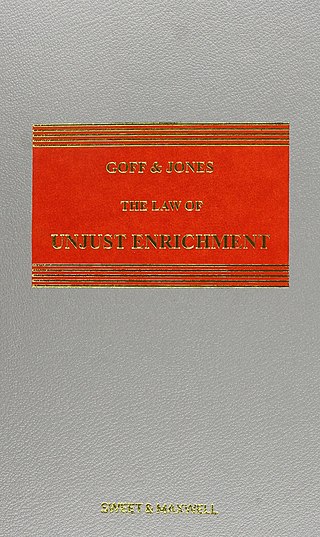Restitution and unjust enrichment is the field of law relating to gains-based recovery. In contrast with damages, restitution is a claim or remedy requiring a defendant to give up benefits wrongfully obtained. Liability for restitution is primarily governed by the "principle of unjust enrichment": A person who has been unjustly enriched at the expense of another is required to make restitution.

A constructive trust is an equitable remedy imposed by a court to benefit a party that has been wrongfully deprived of its rights due to either a person obtaining or holding a legal property right which they should not possess due to unjust enrichment or interference, or due to a breach of fiduciary duty, which is intercausative with unjust enrichment and/or property interference. It is a type of implied trust.

Robert Lionel Archibald Goff, Baron Goff of Chieveley, was an English barrister and judge who was Senior Lord of Appeal in Ordinary, the equivalent of today's President of the Supreme Court. Best known for establishing unjust enrichment as a branch of English law, he has been described by Andrew Burrows as "the greatest judge of modern times". Goff was the original co-author of Goff & Jones, the leading English law textbook on restitution and unjust enrichment, first published in 1966. He practised as a commercial barrister from 1951 to 1975, following which he began his career as a judge. He was appointed to the Judicial Committee of the House of Lords in 1986.

Tracing is a legal process, not a remedy, by which a claimant demonstrates what has happened to his/her property, identifies its proceeds and those persons who have handled or received them, and asks the court to award a proprietary remedy in respect of the property, or an asset substituted for the original property or its proceeds. Tracing allows transmission of legal claims from the original assets to either the proceeds of sale of the assets or new substituted assets.

English trust law concerns the protection of assets, usually when they are held by one party for another's benefit. Trusts were a creation of the English law of property and obligations, and share a subsequent history with countries across the Commonwealth and the United States. Trusts developed when claimants in property disputes were dissatisfied with the common law courts and petitioned the King for a just and equitable result. On the King's behalf, the Lord Chancellor developed a parallel justice system in the Court of Chancery, commonly referred as equity. Historically, trusts have mostly been used where people have left money in a will, or created family settlements, charities, or some types of business venture. After the Judicature Act 1873, England's courts of equity and common law were merged, and equitable principles took precedence. Today, trusts play an important role in financial investment, especially in unit trusts and in pension trusts. Although people are generally free to set the terms of trusts in any way they like, there is a growing body of legislation to protect beneficiaries or regulate the trust relationship, including the Trustee Act 1925, Trustee Investments Act 1961, Recognition of Trusts Act 1987, Financial Services and Markets Act 2000, Trustee Act 2000, Pensions Act 1995, Pensions Act 2004 and Charities Act 2011.

Boardman v Phipps [1966] UKHL 2 is a landmark English trusts law case concerning the duty of loyalty and the duty to avoid conflicts of interest.
The English law of unjust enrichment is part of the English law of obligations, along with the law of contract, tort, and trusts. The law of unjust enrichment deals with circumstances in which one person is required to make restitution of a benefit acquired at the expense of another in circumstances which are unjust.

Attorney General v Blake[2000] UKHL 45, [2001] 1 AC 268 is a leading English contract law case on damages for breach of contract. It established that in some circumstances, where ordinary remedies are inadequate, restitutionary damages may be awarded.

Baltic Shipping Company v Dillon, the Mikhail Lermontov case, is a leading Australian contract law case, on the incorporation of exclusion clauses and damages for breach of contract or restitution for unjust enrichment.
The English law of Restitution is the law of gain-based recovery. Its precise scope and underlying principles remain a matter of significant academic and judicial controversy. Broadly speaking, the law of restitution concerns actions in which one person claims an entitlement in respect of a gain acquired by another, rather than compensation for a loss.
Cobbe v Yeoman's Row Management Ltd[2008] UKHL 55 is a House of Lords case in English land law and relates to proprietary estoppel in the multi-property developer context. The court of final appeal awarded the project manager £150,000 on a quantum meruit basis for unjust enrichment because Yeoman's Row had received the benefit of his services without paying for that. The court refused to find or acknowledge a binding contract, prior arrangement with a third party or promise, overturning a £2m award on the basis of a possible lien arising from a promise over the property. The court found a non-binding agreement in principle, entirely subject to the owner's final say to take into account for example their view of the market; this was the basis on the facts on which the parties were proceeding.

Knowing receipt is an English trusts law doctrine for imposing liability on a person who has received property that belongs to a trust, or which was held by a fiduciary, having known that the property was given to them in breach of trust. To be liable for knowing receipt, the claimant must show, first, a disposal of his trust assets in breach of fiduciary duty; second, the beneficial receipt by the defendant of assets which are traceable as representing the assets of the claimant; and third, knowledge on the part of the defendant that the assets he received are traceable to a breach of fiduciary duty.

The Attorney General for Hong Kong v Reid (UKPC)[1993] UKPC 2 was a New Zealand-originated trust law case heard and decided by the Judicial Committee of the Privy Council, where it was held that bribe money accepted by a person in a position of trust, can be traced into any property bought and is held on constructive trust for the beneficiary.

Westdeutsche Landesbank Girozentrale v Islington LBC[1996] UKHL 12, [1996] AC 669 is a leading English trusts law case concerning the circumstances under which a resulting trust arises. It held that such a trust must be intended, or must be able to be presumed to have been intended. In the view of the majority of the House of Lords, presumed intention to reflect what is conscionable underlies all resulting and constructive trusts.

Foskett v McKeown[2000] UKHL 29 is a leading case on the English law of trusts, concerning tracing and the availability of proprietary relief following a breach of trust.

Murad v Al-Saraj[2005] EWCA Civ 959 is an English trusts law case, concerning remedies for breach of trust for a conflict of interest. It exemplifies a restitution claim.

Barnes v Addy (1874) LR 9 Ch App 244 was a decision of the Court of Appeal in Chancery. It established that, in English trusts law, third parties could be liable for a breach of trust in two circumstances, referred to as the two 'limbs' of Barnes v Addy: knowing receipt and knowing assistance.
Relfo Ltd v Varsani [2014] EWCA Civ 360 is an English unjust enrichment law case, concerning to what extent enrichment of the defendant must be at the expense of the claimant.

Goff and Jones on the Law of Unjust Enrichment is the leading authoritative English law textbook on restitution and unjust enrichment. First written by Robert Goff and Gareth Jones, it is presently in its tenth edition. It is published by Sweet & Maxwell and forms part of the Common Law Library.

Farah Constructions v Say-Dee Pty Ltd, also known as Farah, is a decision of the High Court of Australia. The case was influential in developing Australian legal doctrines relating to equity, property, unjust enrichment, and constructive trusts, as well as the doctrine of precedent as it applies in Australia.












